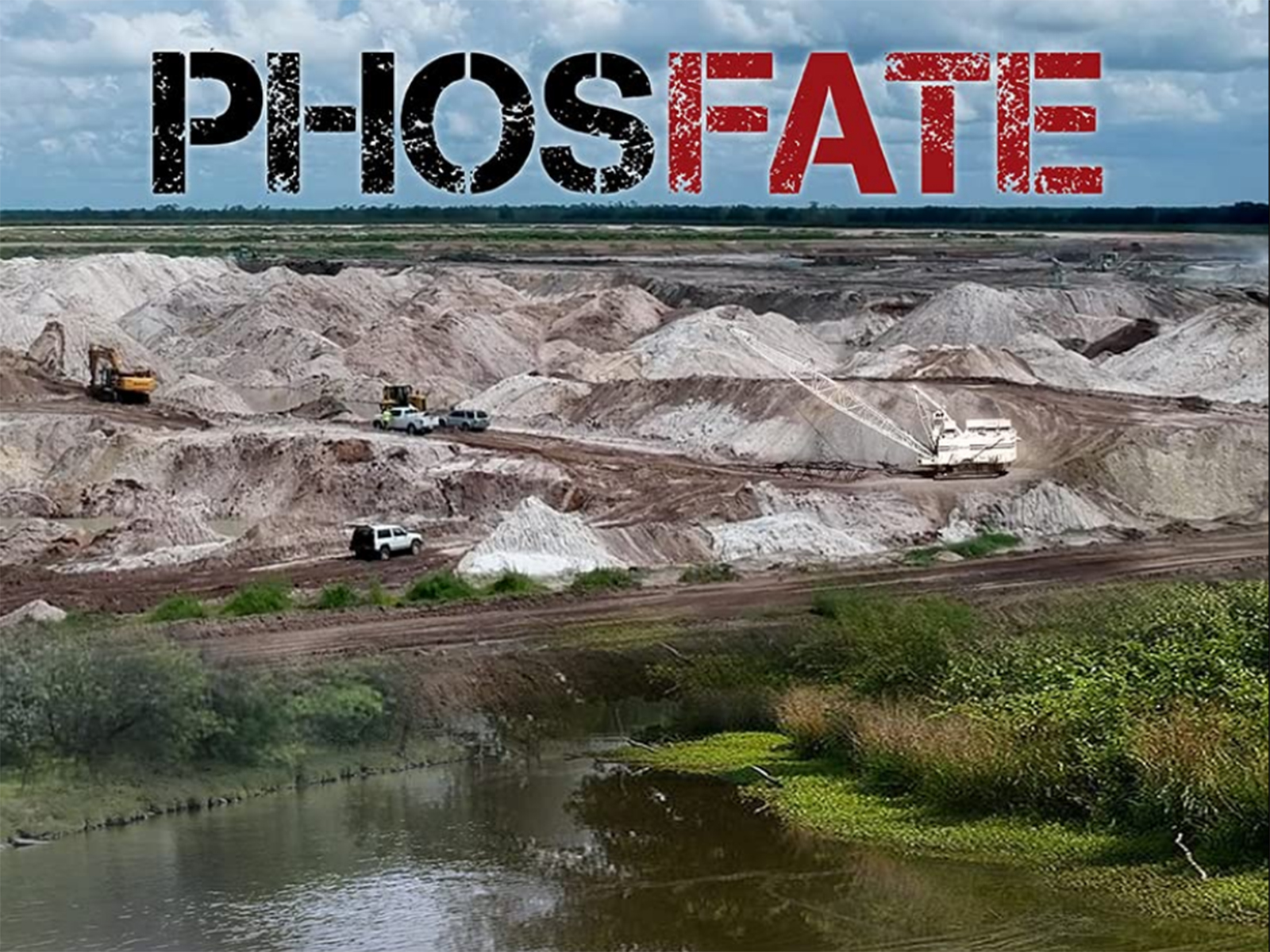
- Film
Docs: Phosfate
While advances in treatment have bolstered the cumulative cure rate, incidences of childhood cancer have spiked roughly 30 percent since the 1970s, and it seems not unreasonable to assume some causal link between this statistical climb and a fairly sustained pattern of environmental deregulation and degradation. Phosfate, an investigative documentary newly available on streaming, uses Florida as a compelling case study for this premise, resulting in an agitative work that sounds like a clarion call for greater citizen involvement in protecting water and natural resources.
Its title a play on the inescapable weight and consequences of rapacious phosphate mining used for fertilizer and other products, director Erik E. Crown’s movie comes from a personal place, given the filmmaker’s own foregrounded struggle with cancer. While it makes a few fitful stabs at connecting its subject matter to worldwide trends, Phosfate centers most of its action in DeSoto County and the broader so-called “Bone Valley” of central Florida, an area nestled between Tampa and Orlando’s Walt Disney World. The corporate villain of the piece is the Mosaic Company, a behemoth that owns 300,000 acres of land in Florida and is responsible for 75 percent of all phosphate mining, an $85 billion industry, in the United States. Even in the wake of disastrous and still-unfolding habitat consequences and a $2 billion fine in 2015 by the Environmental Protection Agency for mishandling 60 billion pounds of hazardous waste, the company seeks to expand its operations.
The chief emotional connection of Crown’s film lies in its portrayal of local activists like Molly Bowen, Jeremy Block and Garrett Ramy – the last of whom is a farmer whose farm lost its USDA status as organic due to its bordering land which Mosaic began mining on. These interviewees give Phosfate a well-shaded human dimension, as does a Skype chat with Stel Bailey, a young woman whose personal and family’s collective battles with non-Hodgkin’s lymphoma are darkly representative of the statistically anomalistic “cancer clusters” present throughout many areas close to Mosaic-mined lands.
Phosfate is not merely a talking-head-style guided tour, though. In fact, far from it: Bowen, Block and others feel like integrated participants. And while Crown neither wields a superb technical prowess nor embraces the flamboyant antagonism of a director like Michael Moore, his movie is nevertheless still a very active and forward-leaning work. Much of its running time find Crown testing water samples with Bowen or using portable Geiger counters to ascertain the levels of ionizing radiation at play-sites frequented by children. (Spoiler alert: the results aren’t good.)
In a couple of instances, Crown cuts corners in a way that feels, if not quite spurious then at least lazy; the manner in which he details denied FOIA requests for regulatory paperwork, for example, hints at some broader conspiracy of silence without really doing anything to earn that designation. The scientific information he offers up, however, is quite factually grounded, if at times admittedly a bit jumbled or rapid-fire in its presentation.
It’s accurate to comment that Phosfate aims, in a pretty transparent way, to put disrespect and disrepute on the name of Mosaic, in much the same way that, a decade ago, a handful of documentaries took aim at agrochemical giant Monsanto, the manufacturer of Agent Orange and Roundup (at least before German pharmaceutical company Bayer swooped in to purchase Monsanto, pay off settlements in dozens of lawsuits, and rename and rebrand its product lines). Crown doesn’t do this dishonestly, though. He gives the corporation many opportunities for response and inclusion (they rather naturally decline participation) and instead speaks to a 15-year contractor who possesses and candidly shares intimate knowledge of their operations – even if said gentleman for some reason doesn’t seem to draw much of a connection between his work and his own infertility. In Mosaic’s official absence, Crown also uses copious local news clips as well as the company’s own cheery commercials, all of which show how well-manicured corporate messaging and a few visible community donations can influence public opinion, or at the very least help limit options for punitive action against its interests.
It’s here, in fact, in the film’s third act, that Phosfate mostly smartly and sadly comes together, highlighting the occupational revolving door between the Florida Department of Environmental Protection and Mosaic’s law firm; the implementation of “voluntary compliance;” and the dispiriting failures of other elected officials to protect or even inform the public they are charged to serve. The solution, and a lesson that can easily translate internationally? It’s obvious, in the form of Phosfate’s other participants: a greater sense of civic duty, and expanded vigilance about the actions of corporations, rather than the blind worship of them as job-providing economic saviors.

